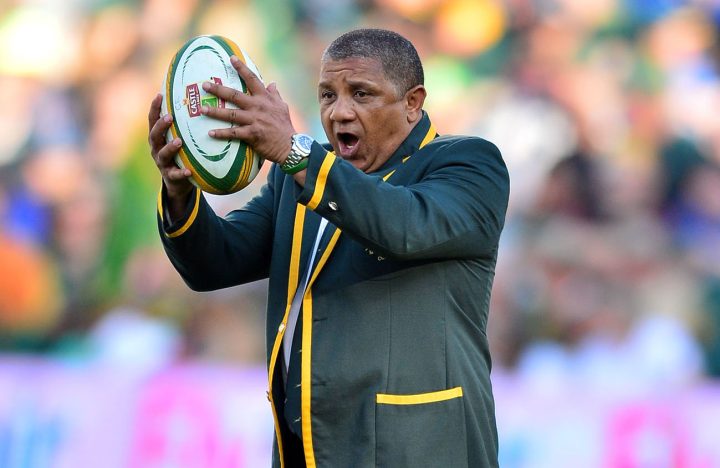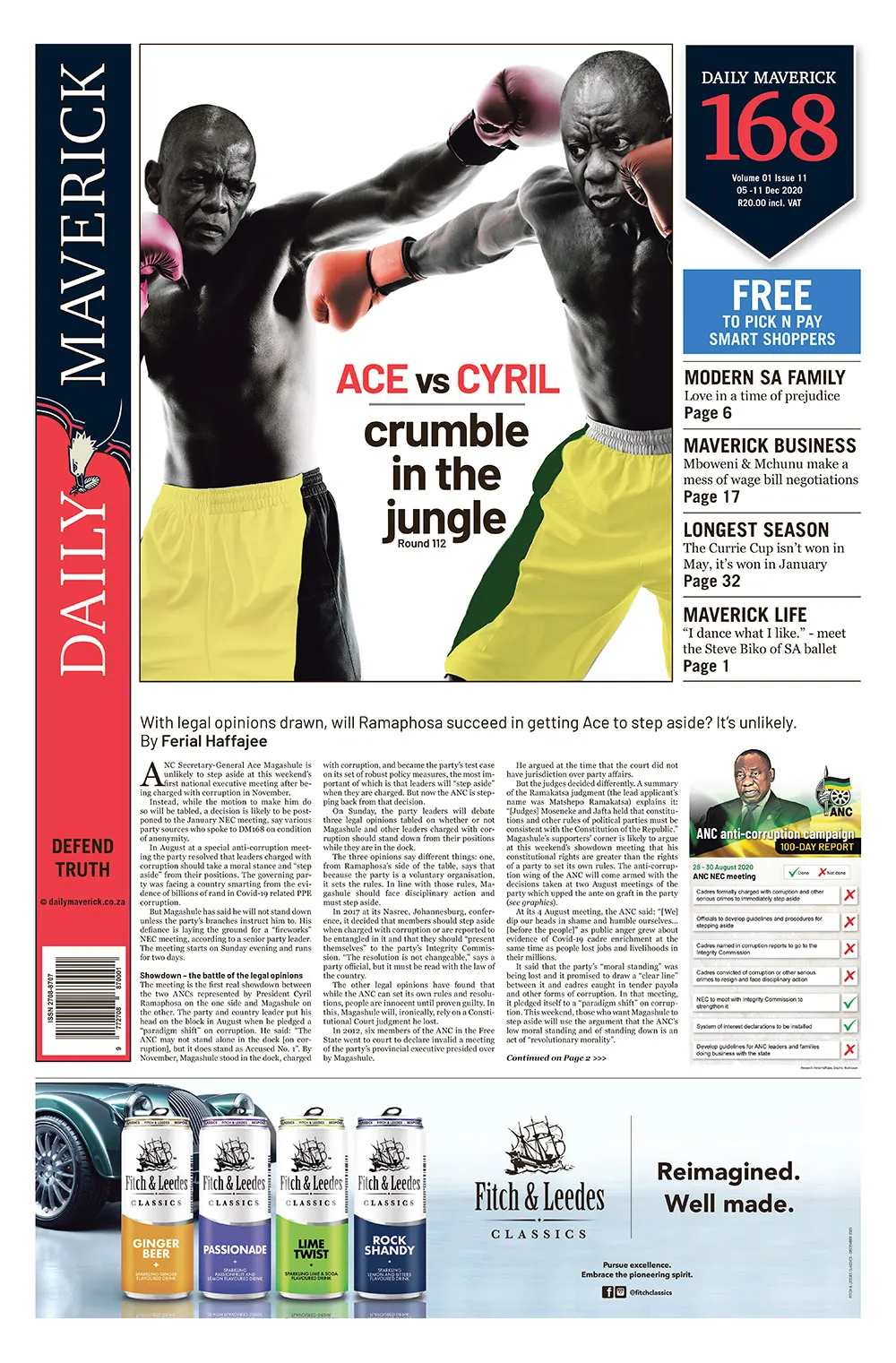DM168 Sport
Why is SA Rugby leaving black coaches on the bench?

Although rugby has come a long way in terms of transformation at player level, burning questions regarding the backing of black coaches continue to simmer.
First published in the Daily Maverick 168 weekly newspaper.
The more things change, the more they stay the same. A number of promising black coaches have come through the system over the past decade. Several of the most experienced black coaches have expressed an interest in leading major Super Rugby and Currie Cup teams during this period.
With that in mind, why have so few taken the hot seat? Why are there fewer black head coaches now than there were 10 years ago?
It’s 2020. Why are there no black head coaches in power at Super Rugby or even at Currie Cup level?
The respective unions and franchises have not done enough to develop black coaches over the past 10 years. Jurie Roux, in his capacity as the CEO of SA Rugby, has made this very point on several occasions.
Lack of opportunities?
Only two out of South Africa’s six franchises – the Southern Kings and Stormers – have backed a black head coach for their Super Rugby teams since 2009. Deon Davids coached the Kings between 2016 and 2019, and Allister Coetzee was at the helm of the Stormers between 2010 and 2015.
Only two out of six Super Rugby/Pro14 franchises have backed a black head coach to spearhead their Currie Cup sides in the same period. Coetzee coached Western Province between 2009 and 2014. David Maidza was in charge of Eastern Province in 2013, Ryan Felix in 2017 and 2018, and Chumani Booi in 2019.
Coetzee and Davids have gone on to hold positions at the Springboks. Coetzee was head coach in 2016 and 2017; Davids is currently an assistant coach. The national side has employed two other black coaches over the past decade, namely Ricardo Loubscher (assistant coach, 2012-2015) and Mzwandile Stick (assistant coach, 2016 and 2018 to present), but neither man has been backed for a head coach position at Currie Cup level or higher.
There’s no getting round the fact that white coaches have received more opportunities than their black counterparts over the past 10 years. Since 2009, 26 of the 28 Super Rugby head coaches have been white (93%), while as many as 45 of the 62 Currie Cup head coaches across the Premier and First Division tournaments have been white (73%). The latter number takes all 14 unions into account.
If one focuses on the unions that feed directly into the six franchises – the Blue Bulls, Eastern Province, Free State Cheetahs, Golden Lions, Sharks and Western Province – it’s interesting to note that 26 out of 30 Currie Cup head coaches were white (87%) in the aforementioned timeframe.
What’s stopping promising young black coaches from cracking on to occupy the top position at the elite levels? Why are the more experienced black coaches being overlooked?
Where is the bottleneck?
Jonathan Mokuena was, until recently, one of South African rugby’s great success stories. Born on the Cape Flats, Mokuena overcame a series of challenges to rise through the junior rugby ranks, captain the Blitzboks, and then star for the Lions and Griquas.
After hanging up his boots, Mokuena moved into coaching and led Pukke to Varsity Cup titles in 2016 and 2018. He also coached the Leopards in the Currie Cup First Division.
At that stage, the pathway to higher honours seemed clear. Swys de Bruin, Nollis Marais, Sean Everitt and John Dobson all coached Vodacom Cup or SuperSport Challenge teams before taking control at Currie Cup and eventually Super Rugby level. Mokuena felt it was a matter of time before he was given a similar chance in the big leagues.
Late last year, however, the opportunities dried up. Two unions expressed an interest in Mokuena’s services before considering alternatives. Not for the first time, the opportunity to reward a promising black coach – and essentially a coach who had excelled at the lower levels – was missed.
Mokuena, who told Daily Maverick that he’s still looking for his next coaching job, has been vocal about the situation. Paul Treu, who left the Stormers to take up the head coach post at the University of the Western Cape earlier this year, has also said that the unions could do more to develop black coaches for top positions.
“It’s frustrating to see how the system has favoured some coaches and not others,” Mokuena said. “That’s why so many coaches of colour across various sports codes have made a noise recently.
“I can’t speak for the respective unions regarding their choices. At some point they will have to take a risk and back a young black coach, just as they have with young white coaches. It’s very much a union-to-union thing. The region around Pukke and the Leopards is predominantly Afrikaans, yet they took a chance on me.”
Last year, I approached the CEOs of the respective Super Rugby franchises for an explanation. At that stage, the franchises were well below the prescribed target of 50% black representation set out by SA Rugby about four years earlier.
Most of the CEOs replied to my inquiries with assurances that a long-term development plan was in place. Two of the unions pointed out that there were people of colour among their medical, logistics and media teams. In doing so, those unions failed to differentiate between team management members and bona fide coaches. The distinction is certainly made in SA Rugby’s Strategic Transformation Plan.
Strategic coaching development
In 2019, Jurie Roux confirmed that SA Rugby was “looking at mechanisms to improve the attitude” towards transformation and black coach development in particular. Asked for an update more recently, Roux suggested it may be some time before there is significant growth in that department.
“The provinces are aware of the coaching imperative,” he said. “There have been cases where our input has been sought and taken when it has come to appointments in the recent past. The mechanism in place is our Strategic Transformation Development Plan 2030, which each union has signed up to on an individual basis with their own self-determined targets. The unions are annually measured against those targets and there is no place to hide when the audit is performed. It is continuously highlighted during the transformation meetings and emphasised as a priority risk area in the STDP2030.
“Each union has its own targets, on a two-year cycle, to reflect the normal contracting period in professional rugby, which can be two to four years for coaches – with the overall objective of increasing black coaches at national and provincial level to 60% by 2030,” Roux said.
Make no mistake, there are a number of good black coaches across the South African rugby structures at present.
Assistant coach Vuyo Zangqa took charge of the Kings in a pre-season match earlier this year – a sign that he may well be considered for a head coach position down the line. The Stormers, after losing Treu last year, brought Rito Hlungwani into their Super Rugby set-up, albeit as an assistant coach.
The Bulls missed a trick when they appointed Pote Human instead of Deon Davids after John Mitchell’s departure in late 2018. They haven’t backed a black head coach at Super Rugby or Currie Cup level since 2009.
Joey Mongalo coached the Golden Lions to U19 Currie Cup title victories in 2016 and 2017, and Bafana Nhleko was at the helm when the Lions U21 team went all the way in 2016 and 2018.
Mongalo served as the Lions’ assistant coach in 2018 and 2019 before moving on to the Bulls this season, whereas Nhleko has been involved in South Africa’s junior structures since 2018. Mzwakhe Nkosi, the SA Schools coach in 2019, headed up the Lions’ SuperSport Challenge team this year. It remains to be seen, however, when exactly the Lions senior side will back a black head coach.
The Cheetahs have favoured a white head coach at Super Rugby, Pro14, Currie Cup and even at Vodacom Cup/SuperSport Challenge level throughout this period. Melusi Mthethwa, who is an assistant coach, has been identified by the union as a leader for the future.
Deon Kayser and Ricardo Loubscher have been at the helm of the Sharks Vodacom Cup side in the past, but are yet to receive a chance to lead the Currie Cup or Super Rugby sides of the region. Loubscher has been in the system for a long time, serving as an assistant at the Bulls, Sharks and Boks.
Breaking into the system
Mokuena is determined to get back into coaching at franchise level. The 38-year-old hopes to break into the Springbok coaching set-up within the next decade. He understands why other black coaches might opt for alternative careers in the near future, though.
“SA Rugby’s plan sounds great in theory, but I would prefer to see a change in attitude sooner. Five, eight or 10 years down the line may be too late,” he said. “Some of the coaches that are in the system are fed up with waiting. They may decide to move on. It would be a tragedy to lose all that potential, and it would be a setback in terms of what SA Rugby wants to achieve in the long run.
“I’m not sure what more SA Rugby can do. Perhaps they can penalise those unions that don’t comply. At the end of the day, it’s the responsibility of the individual unions to transform.” DM168
You can get your copy of DM168 at these Pick n Pay stores.





















 Become an Insider
Become an Insider
Really? This is the best article you could come up with? Please stop my subscription to DM.
I’m so sick of the race card being used to secure sought after positions and manipulate public opinion. Are coaches not appointed on merit and track record? Or are coaches appointed because of their skin colour? Give us a break. I have stopped watching all sport permanently because I’m sick and tired of this constant bleating about race. This saves me hours of precious time and a substantial amount of money.